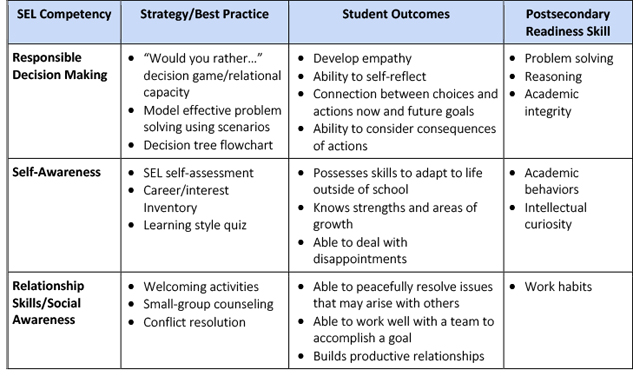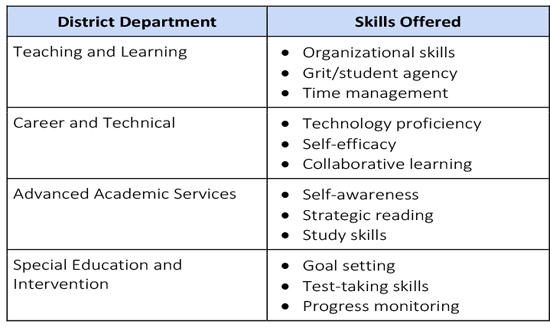
Boost Postsecondary Readiness with SEL
By Nwakaego Edordu Oriji | January 2024

In the ever-changing landscape of education, it is more critical than ever that students not only acquire academic proficiency, but also develop essential interpersonal and life skills. Integrating social/emotional learning (SEL) into a robust comprehensive school counseling program can cultivate an environment that nurtures whole-child development. This equips students with the necessary tools to navigate challenges and successfully pursue their postsecondary goals.
Intentional and practical SEL strategies can have powerful impacts on postsecondary readiness, specifically with secondary grades (6–12), where academic accountability often takes precedence over skill-building practices. Explore the Postsecondary SEL Crosswalk from Garland Independent School District (GISD) that highlights the alignment between SEL competencies, ASCA Student Standards, and college and career standards (Texas). This insightful guide emphasizes the strategic cohesion of these elements, illustrating their collective impact on comprehensive student development in school and beyond the classroom.
Are you ready to boost your students’ postsecondary readiness with SEL? It’s as easy as A-B-C!
Guiding students to engage in self-reflection and recognize the potential for personal growth contributes to the development of proficiency in SEL competencies, including self-awareness, social awareness, relationship skills and responsible decision making. To enhance these SEL skills for postsecondary success, consider implementing the following strategies with your students.

Students who learn to be present and self-regulated in their learning environment demonstrate heightened engagement, effective emotional management and sound decision making – all vital skills for a successful transition to any postsecondary setting. Use the following strategies with your students to cultivate self-management skills and boost postsecondary readiness.
Incorporating SEL skill development into the basic elements of your comprehensive school counseling program strengthens postsecondary readiness. Integrating SEL skill building specifically with the appraisal and advisement component of your program is a strategic approach that addresses student achievement and the development of interpersonal skills. The following examples outline specific appraisal and advisement elements that can be enriched by integrating an SEL skill building component.
Collaboration with various district departments can give a significant boost to building students’ postsecondary readiness. Consider partnering with the following departments to better prepare your students for life beyond high school.

Intentional conversations regarding students’ postsecondary aspirations creates positive and supportive relationships that are essential for preparing students for future endeavors. By actively participating in purposeful dialogue, school counselors can help students gain insights into their personal strengths, areas for growth and ways to overcome challenges in their educational journey. Use these conversation starters with students to foster connections and build relationships:
It's time to craft your plan! Refer to the SEL Postsecondary Readiness Plan from GISD to identify the resources and strategies you can utilize to enhance postsecondary readiness by integrating SEL into your comprehensive counseling program and daily practices. Your personalized plan ensures a strategic alignment of SEL practices with your counseling program components, fostering a holistic and effective framework for supporting students in their postsecondary journey.
Our students thrive when they are well prepared for postsecondary pursuits. By integrating SEL skill development to boost postsecondary readiness and emphasizing whole-child development, we equip our students to become lifelong learners and impactful contributors to a global society.
Contact Nwakaego Edordu Oriji, a counselor facilitator with Garland Independent School District Counseling Services, at noriji@garlandisd.net.
Intentional and practical SEL strategies can have powerful impacts on postsecondary readiness, specifically with secondary grades (6–12), where academic accountability often takes precedence over skill-building practices. Explore the Postsecondary SEL Crosswalk from Garland Independent School District (GISD) that highlights the alignment between SEL competencies, ASCA Student Standards, and college and career standards (Texas). This insightful guide emphasizes the strategic cohesion of these elements, illustrating their collective impact on comprehensive student development in school and beyond the classroom.
Are you ready to boost your students’ postsecondary readiness with SEL? It’s as easy as A-B-C!
A: Assessing Self and Growing
Guiding students to engage in self-reflection and recognize the potential for personal growth contributes to the development of proficiency in SEL competencies, including self-awareness, social awareness, relationship skills and responsible decision making. To enhance these SEL skills for postsecondary success, consider implementing the following strategies with your students.
B: Being Present and in Control
Students who learn to be present and self-regulated in their learning environment demonstrate heightened engagement, effective emotional management and sound decision making – all vital skills for a successful transition to any postsecondary setting. Use the following strategies with your students to cultivate self-management skills and boost postsecondary readiness.- Self-reflection
- Model your own self-reflection
- Encourage gratitude
- Journaling
- Real world connection
- Relate skills to real life and application outside of the classroom
- Goal setting
- Emphasize the importance of setting short- and long-term goals
- Create SMART goals
- Self-care
- Positive affirmations
- Exercise/dance
- Encourage students to share their feelings
C: Creative Comprehensive School Counseling Programming
Incorporating SEL skill development into the basic elements of your comprehensive school counseling program strengthens postsecondary readiness. Integrating SEL skill building specifically with the appraisal and advisement component of your program is a strategic approach that addresses student achievement and the development of interpersonal skills. The following examples outline specific appraisal and advisement elements that can be enriched by integrating an SEL skill building component.- Course selections: Allow student choice for advanced academic opportunities, then encourage as necessary
- At-risk small group support: Choose topics for Tier 2 and 3 interventions, flexible referral process
- Academic strengths: Assess strengths and weaknesses and establish SMART goals
- Transitional Planning
- (ES) Middle School Transition
- (MS) Four-year planning, graduation requirements
- (HS) Postsecondary planning
- CCMR Activities
- To boost college, career and military readiness (CCMR), provide access to college fairs, career days, college visits, career exploration
- CCMR Assistance
- FAFSA/TASFA completion using a custom form, scholarship match tools, college acceptance, career searches and military enlistment
D: Develop a Departmental or District Systematic Approach
Collaboration with various district departments can give a significant boost to building students’ postsecondary readiness. Consider partnering with the following departments to better prepare your students for life beyond high school.
E: Engaging Students in Intentional Conversations
Intentional conversations regarding students’ postsecondary aspirations creates positive and supportive relationships that are essential for preparing students for future endeavors. By actively participating in purposeful dialogue, school counselors can help students gain insights into their personal strengths, areas for growth and ways to overcome challenges in their educational journey. Use these conversation starters with students to foster connections and build relationships:- ASCA Career Conversation Starters
- GISD Community Conversations (Elementary)
- GISD Community Conversations (Secondary)
Plan it out!
It's time to craft your plan! Refer to the SEL Postsecondary Readiness Plan from GISD to identify the resources and strategies you can utilize to enhance postsecondary readiness by integrating SEL into your comprehensive counseling program and daily practices. Your personalized plan ensures a strategic alignment of SEL practices with your counseling program components, fostering a holistic and effective framework for supporting students in their postsecondary journey.Our students thrive when they are well prepared for postsecondary pursuits. By integrating SEL skill development to boost postsecondary readiness and emphasizing whole-child development, we equip our students to become lifelong learners and impactful contributors to a global society.
Resources
- Boost Postsecondary Readiness with SEL (Full Presentation)
- ASCA Student Standards: Mindsets and Behaviors for Student Success
- What Is the Casel Framework?
- Texas College and Career Readiness Standards (2009)
Contact Nwakaego Edordu Oriji, a counselor facilitator with Garland Independent School District Counseling Services, at noriji@garlandisd.net.